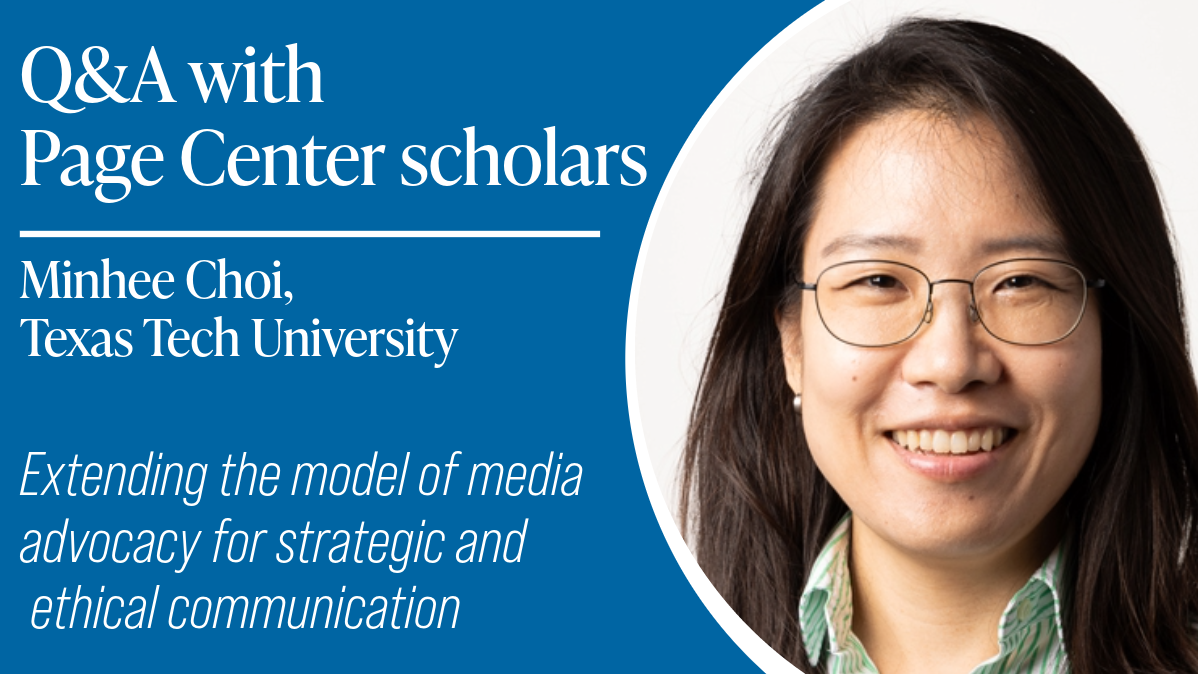How prosocial communication can drive policy – Scholar Q&A with Minhee Choi
September 18, 2023 • Jonathan McVerry

A wealth of research has focused on prosocial communication’s effect on the behavior of publics and stakeholders. There are also studies on prosocial’s influence on civic discourse. However, there is a lack of research on how prosocial communication can alter one of the key ingredients to improving social conditions and solving social problems – policy. For their Page Center study, scholars Minhee Choi, Texas Tech University, and Kelli Boling, University of Nebraska – Lincoln, are interviewing 25 advocacy communicators to help identify the factors that drive public policy change. They hope to extend the model of media advocacy and update an ethical advocacy model in advocacy communication. Choi is a three-time Page Center scholar and discusses the project in the interview below. This is Boling’s first time as a Center scholar. The team’s project is part of the Page Center’s 2023 research call on prosocial communication.
How did your collaboration with Kelli lead to this project?
We met each other in our Ph.D. program at the University of South Carolina. We are both interested in advocacy and communication. My research perspective centers around the direct use of communication with a focus on advocacy and activism. I study effective communication strategy that influences individuals’ behavior related to important social issues. It’s a common area we are both interested in, but the way we look into the topics is different. Mostly I use quantitative data and Kelli is really good at qualitative research methods. I have been exploring this concept of media advocacy and applied the concepts into different public health issues. We are trying to expand that concept – media advocacy that actually influences policymakers to make policy changes.
In terms of the relationship between advocacy and policy change, how or where does prosocial communication fit?
Once you use strategic communication to achieve social change in a positive way, that’s prosocial communication. It can happen at any type of organization, like corporations, nonprofit organizations and government. It’s communicating about certain issues or topics that influence individuals’ behavior, the changing of certain issues and collective civic movement.
What is your plan for your Page Center project?
We will interview 25 advocacy communicators who directly work with policymakers. We hope to identify key strategic communication factors for public policy changes and suggest an updated ethical advocacy model. During the Research Roundtable*, advisory board members gave us a really good sample pool of communicators that we can reach out to. We will reach out to them in September, and our goal is to finish our interviews by the end of this year. And then working on our manuscript next year, we can report our preliminary findings at next year’s Research Roundtable in August.
What are some takeaways you expect to gain when the project is complete?
There is the communication model of corporate social responsibility. The model gives various factors for when a practitioner or researcher needs to consider when to implement or research CSR communication. Media advocacy and the communication for policy change is a different area. There is probably some overlap, but these areas need those types of well-organized models too. We would like to reach that point with this research. At the same time, because this is qualitative data, we would like to test these models into quantitative data as well. So, it will help with more generalizations of our findings.
How did you get interested in this area of research? What motivates you to study advocacy and prosocial communication?
I used to work for PETA (People for the Ethical Treatment of Animals). Lots of persuasion, and it raised a lot of questions during my career because the topic was really provocative. We always tried to put ourselves in the mainstream media. And one way we put ourselves out there was reaching out to policymakers. We wanted to change regulations for experimental animal or change policies for livestock in factory farming. It really matters and actually makes changes. So, a lot of this is based on my practical experience in my career.
What is the Page Center’s role in helping you succeed with your research?
When you do research, it feels like something you do by yourself. You don’t really feel the impact that you think you can make through your research. But joining the Page Center and working with the Page Center’s mission, it helps remind us of the importance of the work we do. So, we don’t feel like we are alone because other people are doing research and focusing on similar topics and important topics. Hearing others at the Research Roundtable and reading the other Q&A interviews in the blog helps me stay motivated about this topic. It’s a really great community.
* The Research Roundtable is an annual event where Page Center scholars present their research to the Center's advisory board, as well as other scholars in their call. Board members offer advice and insights on ways to translate the research into practical solutions for the communications industry.

